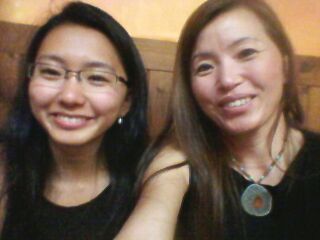By Rora Oh

The author and her mother after leaving the man at the bridge
When my mother was pregnant with my brother, she found out that the Man had not graduated from high school.
‘I married an illiterate’ was the first thought that came to her.
She did not know what to do. Who could she talk to? Her friends? They would certainly laugh at her. Her sisters? They would say she should abort the baby right away. Her parents?
Her father barely finished fifth grade himself, and her mother, like the Man, was illiterate. Some people have to work at a young age—her parents would certainly understand that. That night, she told her mother.
“Stay with him. Work it out. Think of the baby. Think of the baby. Work it out. Stay with him,” she had repeated to my mother.
So my mother listened to her. ‘Yes, I should think of the baby,’ she convinced herself. A baby boy whose life she imagined would be better than hers. She was relieved that someone had told her to stay with the Man.
▪ ▪ ▪
My mother says to me, “That Man was sneaky, you see. He used the baby to keep the marriage alive.”
Her eyes unfocused, she is remembering. “Why hadn’t I seen it then?” she asks the mile of empty space that separates her from me.
▪ ▪ ▪
The Man and my mother are fighting. The Man has whiskey on his breath. They fight about the money. They fight about the broken refrigerator. They fight about the baby.
“Well, damn the baby!” the Man says, and storms out the front door.
With the Man’s blessings, my brother turns two.
▪ ▪ ▪
The four of us are sitting in our 1990 Toyota Corolla with the Man in the driver’s seat. My mother sits in the passenger’s while my brother and I are sitting in the back. I am sleeping.
The Man parks the car on the bridge and tells my mother to jump. The whiskey on his breath turns the air stale.
“Why don’t you jump? Just jump. My life will be so much better if you just jump off the bridge right now. Jump. Jump. JUMP. JUMP!” he bellows at her.
My mother starts to cry and my brother follows her lead. She reaches to the backseat, pulling my brother to her bosom and hugging him tightly to her chest as if it were a shield.
“Damn you,” my mother curses at the Man over and over again until the Man and the baby both fall asleep.
▪ ▪ ▪
The next day, my mother awakes with blood on her chest. Not her blood. She instinctively looks left. She sees the Man asleep, still alive. She curses and checks on the baby. His face is smothered in blood.
“Son, wake up. Oh, God, what did I do? Wake up wake up wake up,” she begs shaking the baby, rattling him back and forth like a toy that she had just broken.
My brother opens his eyes. He smiles, bloody marks crusted heavily around his nose.
Only a bloody nose.
He is the baby boy whose life she imagined would be better than hers. She gets out of the car and flings the Man’s briefcase over the bridge, into the water.
▪ ▪ ▪
I cannot hold back the pain as she tells me the painful stories that I cannot remember. I let the beads of sorrow drip down my face.
“Did you ever want to jump?” I ask my mother.
“Never,” she says. “I never wanted to jump when I had two beautiful babies in the car with me.”
▪ ▪ ▪
I forgive the Man. I know you don’t. If I can make him jump from the bridge with the power of my writing, would you forgive him?
▪ ▪ ▪
Two days after that day at the bridge, the Man jumped, leaving us to live in the world.
About the Author: Rora Oh is a 1.5 generation Korean American who took up writing only after immigrating to the United States. She received her B.A. in Asian American and Asian Diaspora Studies at University of California-Berkeley, and is completing her J.D. at University of Southern California. She is inspired to write Asian American fiction as an act of love for her mother, who raised two children by herself in a foreign country after surviving years of domestic abuse and homelessness.
